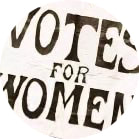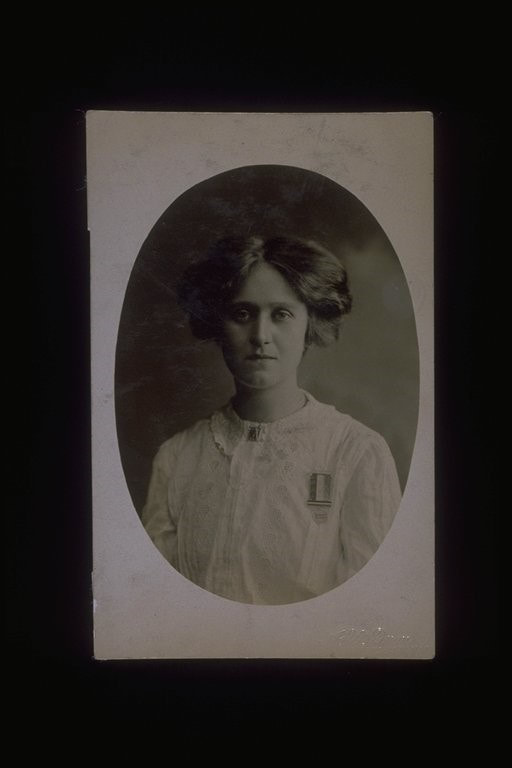|
Annie Ainsworth was arrested on 25 February 1909 [this arrest is recorded incorrectly as 1908] and 22 November 1911, alongside Violet Aitken [see below]. The first arrest followed another attempt by the WSPU to enter the House of Commons. Following a meeting, at Caxton Hall a deputation led by Mrs Pethwick Lawrence, the secretary of the WSPU, set off to the House of Commons. The police stood firm before the door; the women were shoved forwards towards them by the crowd that had gathered to watch and demanded in vain to be admitted. The police removed them from the area one by one, but many endeavoured to return to the doorway being seen off by a large number of police congregated the other side of the doors. Some were arrested, others attempted to rally again or make speeches. Twenty-seven women and one man were arrested among them Annie who was recorded as being twenty-eight years old; she gave her address as 4 Clement’s Inn, the headquarters of the WSPU. When the matter came to court Annie refused to pay the £10 fine and was imprisoned for one month. Mrs Pethwick Lawrence lobbied the authorities for the right of the suffragette prisoners to exercise together and converse while so doing assuring them that if this concession was granted they would not breach the rule outside of the exercise period and would not cause any other trouble. A report includes a robust response: ‘I think this request is quite inadmissible…they want to dictate their own terms as to how they are to serve their self-imposed sentences’. The anonymous author continued to explain how, while Mrs Pankhurst and her daughter, had previously been allowed to exercise together this was only due to the former’s ill health and such a concession would not be applied. The prisoners were 2nd Division and therefore not entitled to such privileges. Annie's second arrest, in November 1911, was for breaking windows with Kathleen Broadhurst at the West Strand telegraph office. They were fined 15 shillings or one week’s imprisonment. The campaign, this episode was part of, is discussed in more detail below. At the Great March held on 8 June 1910, Annie was in charge of leaflet distribution along the route and her involvement continued over the years with financial donations, leading the organisation of the Suffragette summer party in 1913 or leading a group of mourners at Emily Davison’s funeral. Laura Ainsworth was arrested in Birmingham on 18 September 1909. Much has been written about Laura, for example at https://spartacus-educational.com/WainsworthL.htm. Violet Aitken [full name Marion Violet Aitken] was arrested on 22 November 1911, 5 March 1912.
Born in 1886 in Bedford she was the daughter of William and Eleanor Aitken. Her grandfather, Robert Aitken, printed the first English Bible in America in 1782. William, an evangelist, first worked with William Pennefather, the founder of the Mildmay Conferences and the Deaconess movement where women lived together to be trained to work where they were most needed supporting hospitals, education or poor relief. The Mildmay continues today as an Aids and HIV charity. William was next appointed to Christ Church, Liverpool but when his wife’s health failed, he moved his family to the fresh air of Derbyshire, and he travelled the length and breadth of the country preaching. He made two preaching tours to America, the last in 1896. In 1900 he was appointed Canon at Norwich Cathedral. A member of the WSPU, Laura was one of two hundred and twenty-three arrested including three men in Whitehall and Parliament Square on 22 November 1911. The WSPU had organised a demonstration, and in response the police were out in force. Some women attempted to force their way into the House of Commons while others began smashing windows at the Treasury and Scottish Education Office moving along Whitehall throwing stones at windows as they went. The stones were in contained small drawstring bags, and they used the strings as a form of sling to give the stone momentum. Windows were also smashed in the Strand and at Somerset House. The protest continued after their arrests with some women using their elbows to smash windows at the police stations. Violet was arrested and charged with obstruction. She was sentenced to five days imprisonment. Like many who wished to retain an element of anonymity she gave her address as the WSPU headquarters. In 1912 the WSPU escalated the window-smashing campaign. Violet was again arrested on 5 March 1912. The charge sheet for Violet states that she was arrested along with Clara Giveen for breaking twelve windows valued at £100 at the premises of Jays Limited in Westminster. Her father wrote in his diary: “she has been again arrested and this time for breaking plate glass windows, I am overwhelmed with shame and distress to think that a daughter of mine should do anything so wicked… ‘But my poor wife! It’s heart breaking to think of her being exposed in her old age to the horror….God help us!’ Violet was sentenced to four months imprisonment. The Times reported on 26 June 26, 1912, that due to overcrowding at Holloway some women prisoners were moved to Winson Green prison, Birmingham. Violet was one of them. Refusing food, she was force fed. The file covering her internment makes bleak reading. The entry for Violet on 23 June notes that she was fed by a nasal tube and ‘vomited continuously’. One report, stamped 26 June 1912, records: 'No change. To be force fed again tonight’. The report goes on to note that it had been recommended by telephone that if necessary, Violet should be released. This decision was in response to a medical report which noted: ‘Vomited considerably-nervous anaemic state – continued force feeding would endanger health’. Keir Hardie, a Labour member of Parliament, requested details of the medical qualifications of persons subjecting the women to force feeding. He was informed they were all qualified with experience in lunatic asylums, but their names would be withheld in case of reprisals. The files include a petition signed by one hundred and fourteen medical practitioners asserting that the danger came from the ‘force’ element of feeding which distinguished it from feeding tubes used as part of medical practice. It was the element of force which could cause suffering and potential damage. Shortly afterwards, Violet was released on medical grounds; she was recorded as being in a ‘fair’ state. She was immediately admitted to a nursing home. After, for a time, she worked for The Suffragette, the printed voice of the campaign for votes. She died in 1987 in Hertfordshire, aged 101.
0 Comments
Leave a Reply. |
Categories
All
|
Proudly powered by Weebly



 RSS Feed
RSS Feed
